初一英语(师大版)-U5 Lesson 13 Changes in Our Town 2-3 学习任务单
2019秋期七年级英语下册 Unit 5 Now and Then Lesson 13 Changes in Our Town课件(新版)北师大版
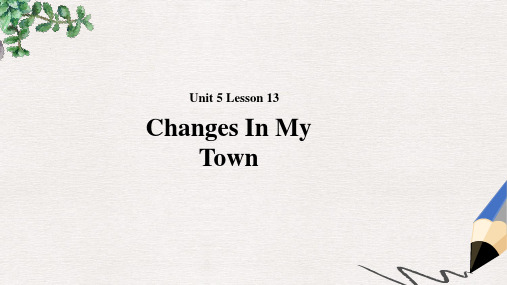
Read the dialogue again to complete the dialogue below.
Read the dialogue for the third time and answer:
What changes are mentions in the dialogue?
the city
2019/7/13
最新中小学教学课件
24
谢谢欣赏!
2019/7/13
最新中小学教学课件
25
are far away from each other; seldom talk to neighbors
Talk about your homework:
Talk about: the city, buildings, people, traffic, shops your house, the schools, the roads/streets, the restaurant, the park…
clean close dirty small
Warm-up
big cheap expensive far
clean close dirty small
Warm-up
cheap expensive far
clean close dirty
Warm-up
cheap expensive far
clean close dirty
What’s your city like?
e.g.: Our city is very big and clean.
What are the streets like? e.g.: The streets are wide.
2019-2020秋期七年级英语下册 Unit 5 Now and Then Lesson 13 Changes in Our Town课件(新版)北师大版

Warm-up
bad big cheap clean close dirty
expensive far good
small
Warm-up
bad big cheap clean close dirty
expensive far good
small
Warm-up
big cheap expensive far
What’s your city like?
e.g.: Our city is very big and clean.
What are the streets like? e.g.: The streets are wide.
What are things in the shops like? e.g.: The things in the shops are beautiful.
思路就是我们思考问题的步骤。例如老师在讲解一道数学题时,首先思考应该从什么地方下手,然后在思考用什么方法,通过什么样的过程来进行解 答。听课时关键应该弄清楚老师讲解问题的思路。
三、听问题。
对于自己预习中不懂的内容,上课时要重点把握。在听讲中要特别注意老师和课本中是怎么解释的。如果老师在讲课中一带而过,并没有详细解答, 大家要及时地把它们记下来,下课再向老师请教。
四、听方法。
在课堂上不仅要听老师讲课的结论而且要认真关注老师分析、解决问题的方法。比如上语文课学习汉字,一般都是遵循着“形”、“音”、“义”的 研究方向;分析小说,一般都是从人物、环境、情节三个要素入手;写记叙文,则要从时间、地点、人物和事情发生的起因、经过、结果六个方面进行 叙述。这些都是语文学习中的一些具体方法。其他的科目也有适用的学习方法,如解数学题时,会用到反正法;换元法;待定系数法;配方法;消元法; 因式分解法等,掌握各个科目的方法是大家应该学习的核心所在。
初一英语(师大版)-U5 Lesson 13 Changes in Our Town 1-2课件

shopping centres
not any shopping centres
many shopping centres
Does everything change in the town?
Does Grandpa like the changes?
friendly to each other
flat
neighbour
Can you read them?
close clean expensive
far dirty cheap
Can you match them?
building
小镇
town hometown
楼房;建筑物 公寓;单元房
flat
家乡
Can you match them?
U5 Lesson 13 Changes in Our Town 1
初一年级 英语
Does this look like your town?
My hometown
Shunyi is my hometown. It is big and beautiful.
hometown n.
家乡;故乡
My hometown
Does the town change awn change a lot?
Then
Now
hometown very small
a big city
Changes in Our Town
What changes will Linda and grandpa talk about?
Let’s listen and check.
a) They aren’t very expensive now.
北师大版七年级下册英语Unit5Lesson13ChangesinOurTown说课稿

4.通过示例和练习,帮助学生理解并掌握一般过去时和一般将来时的运用。
(三)巩固练习
为了帮助学生巩固所学知识并提升应用能力,我计划设计以下巩固练习或实践活动:
(二)教学反思
在教学过程中,我预见到以下问题和挑战:
1.学生对一般过去时和一般将来时的理解可能不够深入,容易混淆。
2.课堂互动中,部分学生可能参与度不高。
应对措施:
1.通过示例、练习和对比,帮助学生明确两种时态的区别和用法。
2.鼓励学生积极参与,对课堂表现给予评价和奖励。
课后评估教学效果:
1.观察学生的课堂表现,了解他们对知识点的掌握情况。
情感态度与价值观:1.培养学生对家乡变化的关注和热爱;2.培养学生积极面对生活中的变化,树立正确的价值观。
(三)教学重难点
根据对学生了解和教学内容分析,本节课的教学重点和难点如下:
重点:1.生词和短语的掌握;2.句型的运用;3.一般过去时和一般将来时的运用。
难点:1.对一般过去时和一般将来时的理解;2.句型There used to be...,Now there is/are...,There are going to be...的运用。
主要知识点包括:1.生词和短语:empty,nobody,quiet,famous,cinema,park,restaurant,shop,used to;2.句型:There used to be...,Now there is/are...,There are going to be...;3.一般过去时和一般将来时的运用。
北师大版七年级英语下册Unit5Lesson13ChangesinOurTown(第二课时)教学设计
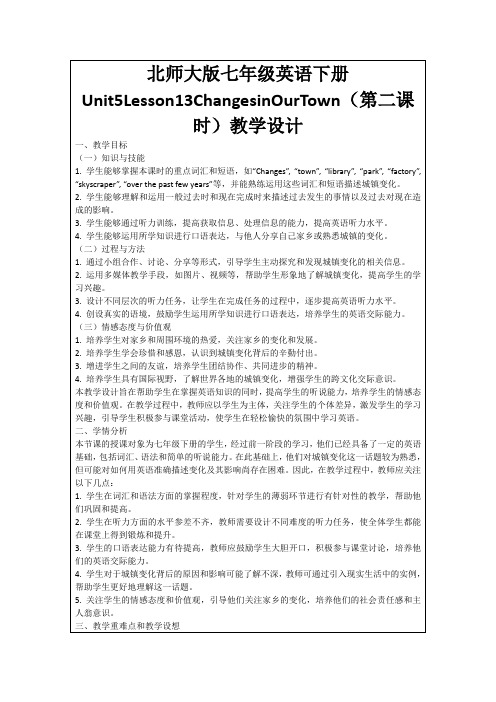
2.重点:培养学生关注家乡和周围环境变化的意识,提高学生的社会责任感。
难点:如何激发学生对城镇变化话题的兴趣,引导他们思考变化背后的原因和影响。
(二)教学设想
1.采用任务型教学法,设计不同层次的听说任务,引导学生积极参与,提高他们的英语实践能力。
2.学生能够理解和运用一般过去时和现在完成时来描述过去发生的事情以及过去对现在造成的影响。
3.学生能够通过听力训练,提高获取信息、处理信息的能力,提高英语听力水平。
4.学生能够运用所学知识进行口语表达,与他人分享自己家乡或熟悉城镇的变化。
(二)过程与方法
1.通过小组合作、讨论、分享等形式,引导学生主动探究和发现城镇变化的相关信息。
2.学生在听力方面的水平参差不齐,教师需要设计不同难度的听力任务,使全体学生都能在课堂上得到锻炼和提升。
3.学生的口语表达能力有待提高,教师应鼓励学生大胆开口,积极参与课堂讨论,培养他们的英语交际能力。
4.学生对于城镇变化背后的原因和影响可能了解不深,教师可通过引入现实生活中的实例,帮助学生更好地理解这一话题。
2.运用多媒体教学手段,如图片、视频等,帮助学生形象地了解城镇变化,提高学生的学习兴趣。
3.设计不同层次的听力任务,让学生在完成任务的过程中,逐步提高英语听力水平。
4.创设真实的语境,鼓励学生运用所学知识进行口语表达,培养学生的英语交际能力。
(三)情感态度与价值观
1.培养学生对家乡和周围环境的热爱,关注家乡的变化和发展。
2.讲解一般过去时和现在完成时的用法,结合城镇变化的具体例子,让学生理解并掌握这两种时态的用法。
北师大版七年级下册英语Unit5Lesson13ChangesinOurTown教学设计

(四)课堂练习
1.口语练习:教师设计口语练习题,让学生运用所学词汇、句型和时态,描述家乡的变化。
2.阅读练习:学生阅读课文,完成相关的阅读理解题目,提高阅读技巧。
3.写作练习:学生根据课堂所学,撰写一篇关于家乡变化的短文。
4.互动游戏:设计小组竞赛、接龙游戏等,让学生在轻松愉快的氛围中巩固所学知识。
2.学习并运用一般过去时和现在完成时描述过去和现在的变化,掌握句型结构,如:“There used to be…”, “Now there are…”, “It has changed a lot over the past few years.”等。
3.提高学生的听说能力,通过听力练习,理解并获取课文中的关键信息,学会用英语进行讨论和表达自己的观点。
5.阅读理解:通过问题引导,让学生逐步深入阅读课文,培养他们的阅读技巧,提高阅读理解能力。
6.写作输出:指导学生运用所学词汇、句型和时态,撰写关于家乡变化的短文,提高写作能力。
7.总结与反思:在课堂尾声,引导学生总结本课所学,分享学习心得,培养自我反思和评价的能力。
8.课后作业:布置适量、有针对性的课后作业,帮助学生巩固所学知识,同时为下一节课做好准备。
6.观察任务:让学生观察自己所在社区或学校附近的环境、交通等方面的变化,用英语记录下来,并在下节课进行分享。
7.互动作业:与同学组成学习小组,互相提问关于家乡变化的问题,并进行回答,以提高口语交流能力。
8.家长参与:鼓励学生与家长一起完成口语作业,让家长了解孩子的学习情况,并增进亲子互动。
作业要求:
2.深入讲解一般过去时和现在完成时的区别与联系,设计相关练习,让学生在实际语境中运用和巩固。
北师大版七年级英语下册Unit5Lesson13ChangesinOurTown(第二课时)教学设计

3.教师强调本节课的重点和难点,提醒学生注意一般现在时和一般过去时的运用。
4.教师布置课后作业,要求学生运用所学知识,观察并描述自己家乡的变化,将所学知识运用到实际生活中。
五、作业布置
1.结合本节课所学内容,请学生观察并记录下自己家乡的三个变化,尽量使用本节课所学的词汇和句型进行描述。要求学生以小作文的形式完成,字数不限,旨在培养学生的观察力和写作能力。
5.教学过程中,教师应注重培养学生的思维能力,引导学生通过观察、分析、归纳等方法,发现事物的变化规律,提高学生的思维品质。
6.结合情感态度与价值观目标,教师可组织学生进行小组讨论,让学生分享自己家乡的变化,培养对家乡的热爱之情。同时,引导学生关注环境保护,树立绿色环保意识。
7.教学评价方面,采用形成性评价和终结性评价相结合的方式,关注学生在学习过程中的表现,及时发现和解决问题。通过课堂提问、小组展示、课后作业等途径,全面评估学生的学习效果。
2.分组进行课后实践活动,要求每组学生选择一个家乡的变化点,通过采访、调查等方式,了解该变化背后的故事。学生需整理采访内容,以手抄报或PPT形式展示,提高学生的团队协作和口语表达能力。
3.完成课后练习册中与本节课相关的练习题,巩固一般现在时和一般过去时的用法,强化词汇和句型的记忆。
4.鼓励学生利用网络资源,查找有关家乡变化的英文资料,了解国内外城镇发展的现状和趋势,拓宽学生的知识视野。
(二)过程与方法
1.通过小组合作、讨论等形式,让学生在互动中学习英语,提高学生的合作意识和团队精神。
2.利用图片、情境等教学资源,创设真实语境,引导学生观察、思考、表达,培养学生的观察力和思维能力。
3.运用任务型教学法,设计不同难度的任务,让学生在完成任务的过程中,逐步掌握语言知识,提高语言运用能力。
北师大版英语七年级下册Lesson13 Period2精品教案

教学步骤
教师活动
学生活动
设பைடு நூலகம்意图
Grammar
Show the pictures of the teacher’s hometown years ago and ask some questions. Ask the students to read the dialogue again. Circle and pay attention towas, were, was not (wasn’t)orwere not (weren’t). Lead the students to pay attention tothe usage of was and were.Then complete the table withwas, were, was not (wasn’t)orwere not (weren’t). Get the students to write questions about the town in Exercise 3, Then ask and answer the questions in pairs.
Answer the teacher’s questions and focus on the usage ofwasandwere. Read the dialogue again. Circle and pay attention towas, were, was not (wasn’t)orwere not (weren’t).Focus on theusage of was and were. Then complete the table withwas, were, was not (wasn’t)orwere not (weren’t). Write questions about the town in Exercise 3, Then ask and answer the questions in pairs.
北师大版七年级英语下册Unit 5 Lesson 13精品课件(28张)
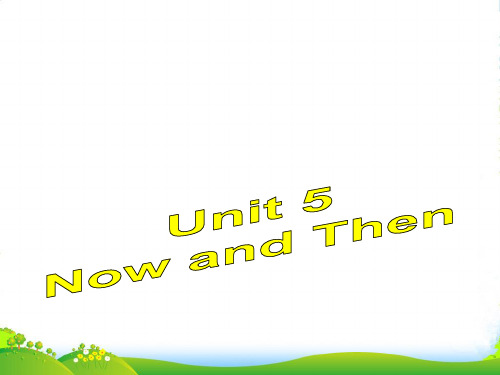
cheap expensive far
close
close far
close far
tall good small
clean short
cheap
bad
dirty expensive
big far close
Make Sentences
tall short good bad small big
Time flies. Value the time.
Homework:
点击添加文本
点击添加文本
1 To read the dialogue aloud.
2 To write a passage about the
changes of点击y添o加u文r本hometown. 点击添加文本
不习惯读书进修的人,常会自满于现状,觉得再没有什么事情需要学习,于是他们不进则退。经验丰富的人读书用两只眼睛,一只眼睛看到纸面上的话,另 一眼睛看到纸的背面。2022年3月29日星期二2022/3/292022/3/292022/3/29 书籍是屹立在时间的汪洋大海中的灯塔。2022年3月2022/3/292022/3/292022/3/293/29/2022 正确的略读可使人用很少的时间接触大量的文献,并挑选出有意义的部分。2022/3/292022/3/29March 29, 2022 书籍是屹立在时间的汪洋大海中的灯塔。
small
big cheap clean close dirty
expensive far
small
cheap clean close dirty expensive far
cheap clean close dirty expensive far
初一英语(师大版)-U5 Lesson 13 Changes in Our Town 2-2课件

Please complete the sentences with
too or either.
Activity 6. Complete the table with
was or were.
一般疑问句
Activity 6. Complete the table with
was or were.
Activity 7. Please ask and answer the questions in pairs.
Activity 7. Please ask and answer the questions in pairs.
Activity 8. Where were you at these times yesterday?
Was my mum always at the shopping centre?
Underline the key sentences.
They aren’t very expensive now.
What changes do they talk about?
No.
What changes do they talk about?
Be care ful! I can h ear a bear . Wh ere is it? It’s out there . Can you hear it? I think it’s coming in here . Quick! Run up the stair s!
What have you learned?
Homework
1. Do Workbook Page 94, Exercise 1& 2. 2. Read with the recording about /iə/& /eə/
七年级英语下册Unit5NowandThenLesson13ChangesinOurTown同步练习新版北师大版word格式

Unit 5 Now And ThenLesson 13 Changes In My Town同步练习1. I don't have much money to buy this car. It's e .2. The park near my home is very d, I don't like to go there.3. Grace is my n . She lives next to me.4. The street has lots of t . It's very busy.5. We have fun at the shopping c .6. The boy is shy. He is a of speaking English in front of his classmates.7. I'm too e to say anything.1. 那个公园什么样子?was the park ?2. 他很容易地完成了作业。
(词数不限)He .3 ---上周末你做什么了?--- 我去野营了。
--- you last weekend?--- I .4. 因为公共场所禁止吸烟,我相信越来越多的人将会戒烟。
(词数不限)I believe more and more people will smoking because it's not allowed in public.5 约翰每天花费一个小时做作业。
John an hour his homework every day.1. --- When_______ your father at work?--- The day before yesterday.A. isB. doesC. didD. was2. Why_______ late for school?A. were youB. do youC. don't youD. you were3. London ________the 2012 Olympic Games.A. holdB. holdsC. is holdingD. held4. --- Did your father work in America in 2000?--- _________ . He worked in Australia.A. No, he doesn'tB. Yes, he doesC. No, he didn'tD. Yes, he did5. What _______she________ for breakfast?A. did; didB. do; hadC. did; haveD. do; has6. There _________lots of people at the restaurant when I got there.A. isB. wasC. areD. were7. --- Can she go out on school nights?--- No, she _________. And I can't .A. doesn't; tooB. doesn't; eitherC. can't; tooD. can't; either8. Let me_________ Tony and Daming_______ you.A. introduce; toB. to introduce; forC. introduce; forD. to introduce; to9. We felt _________ when Liu Xiang won the first prize again in the race.A. braveB. proudC. successfulD. worried10._________, we should peel three bananas to make a milk shake.A. At firstB. At lastC. FinallyD. In the endAt noon, it was very hot because the sun was very strong. Johnny was too tired to 1 . There were no trees near the road, 2 he had a rest under a big rock(岩石). After he 3 some water, Johnny took off his shirt.He lay down on the ground and fell 4 at once.He was so tired 5 he did not wake up until the evening. He was going to jump up. Suddenly he 6 something moving near his feet. He looked down and saw a long black snake.Johnny was so 7 that he did not dare to move. The 8 began to crawl(爬) beside him. It crawled on and on until it disappeared under the rocks. Johnny jumped up 9 and nervously, picked up his 10 and ran off down the road.1. A. take B. come C. make D. walk2. A. so B. but C. and D. or3. A. took B. made C. drank D. kept4. A. sleeping B. asleep C. slept D. sleep5. A. what B. that C. why D. which6. A. knew B. understood C. studied D. felt7. A. excited B. tired C. frightened D. happy8. A. snake B. cat C. monkey D. mouse9. A. quickly B. quick C. angry D. angrily10. A. handbag B. hat C. shirt D. shoesAround the world, summer vacation means long days, sunshine, swimming, sleeping in and, most importantly, no school.Hundreds of years ago, students took the summer off to help their parents in the fields. Today, though, summers are full of fun—no work. A summer vacation means so many opportunities for kids: extra classes, sports, hobbies or catching up on studies.If you're lucky, during the weeks away from school, you can volunteer, travel or go to a camp. It's time to do a part-time job to learn a new skill. Youmay hang out with friends all day. Some kids just kick off their shoes and jump into rivers and swimming pools.If you're not so lucky, summer vacation may mean summer school—a long, hot summer inside the classroom.Whatever your plans, make this summer a good one. Take on a project. Learn something! Help someone! Make this summer one to remember.1. What does summer vacation mean all over the world?A. Long days.B. Activities.C. No school.D. All above.2. What did students do in their summer vacation hundreds of years ago?A. They studied in extra class.B. They worked in the fields.C. They volunteered.D. They went abroad.3. Do students need to go to the classroom in summer vacation?A. No, they don't.B. Yes, of course.C. Maybe, some will.D. Sure, they will.4. If you want to learn a new skill, you may .A. do a part-time jobB. sleepC. kick off your shoesD. jump into rivers5. What is the best title for this passage?A. World of SummerB. The History of SummerC. Unlucky SummerD. Old Summer参考答案1.expensive2. dirty3. neighbour4. traffic5. centre6. Afraid7. excited1.What; like2.easily finished his homework/finished his homework easily3.What did, do, went camping4. give up5. spends doing/ on1. D2. A3. D4. C5. C6. D7. D8. C9. D10. D1. D2. A3. C4. B5. B6. D7. C8. A9. A10. C1. D2. B3. C4. A5. A。
北师大版英语七年级下册Unit 5 Now and Then Lesson 13 Changes i

Unit 5 Now and Then Lesson 13 Changes in Our Town同步练习一、翻译以下句子。
1.It wasn’t like this when your Mum was here._____________________________________2.Our town was very small._____________________________________3.Now we live in large flat._____________________________________4.It’s easy to travel around the town._____________________________________5.There were only small shops._____________________________________6.Let’s go and get some candies._____________________________________二、翻译以下单词。
1.expensive ___________________2.short ___________________3.far ___________________4.tall ___________________5.small ___________________6.dirty ___________________7.close ___________________8.clean ___________________三、请将以下单词正确排序。
1.ffictra____________ ________________________ ________________________ 6.cyclebi ____________b ____________ ____________9.tyci ____________ 10.townhome____________四、选择填空。
Unit5nowandthenlesson13changesinourtown

Unit 5 Now And ThenLesson 13 Changes in Our Town本课是北师大版《初中英语》教材七年级下册第五单元第十三课,课题是Changes in Our Town。
本课为第一课时,是一篇祖孙间展开的关于“小城面貌和生活的今昔对比”的对话语篇。
本节课一方面训练学生获取和分析具体信息及归纳提炼主旨要义的能力,另一方面引导学生初步感知be动词一般过去时的用法和意义。
第二课时在复习课文语言和内容的基础上,引导学生归纳总结本课的语法:be动词一般过去时的基本用法,通过观察和分析例句,关注含有be动词的一般过去时的肯定否定结构及副词too和either的用法。
【知识与能力目标】1. Key vocabulary2. Key structures:【过程与方法目标】1通过阅读,获取关于“城市、建筑、人、交通、商店”等五方面社区变化的具体信息以及情绪和情感信息;2.在阅读中,关注并归纳be动词一般过去时的基本用法;3.使用be动词一般过去时简单描述自己家乡的变化【情感态度价值观目标】通过对比过去和现在,感受时间的珍贵。
【教学重点】提取关于“城市、建筑、人、交通、商店”等五方面变迁的具体信息,同时关注并归纳be动词一般过去时的基本用法。
【教学难点】如何引导学生对文本信息进行深入思考,以及如何在设置的语境中使用be动词一般过去时简单描述自己家乡的变化。
Tape recorder, MultimediaStep 1. BrainstormShow a picture of a city which has changed a lot and ask some questions.Step 2. Warm-upIntroduce the Key Adjectives and then play the recording of them. Show pictures to help the students put the adjectives in opposite pairs and then describe the pictures with the Key Adjectives.Step 3. Pre-reading1. Play the recording of the dialogue and ask the students to read aloud with the speaker. Show the students the table and help them recall the changes in the town and ask them to work in pairs and talk about the changes in the town. Get the students to have a free talk about the changes in their hometown or Mentougou. Help the students look at the changes correctly. Show the students some pictures and some sayings about time to get them to learn to tr2. Introduce the postcard, and give them the questions. And then play the tape for them.Go over the questions and listen to the tape to get the answers.◆课前准备◆教学过程3.Check the answers.Step 4. Reading1st reading: Ask the students to focus on the beginning to find out the correct answers to the two questions. Who are talking? What are they talking about?2nd reading: Show the students how to find out the key words to complete the dialogue. Call back the answers in a whole-class setting.3rd reading: Ask the students to read and find out the 5 aspects they mentioned in the dialogue. And then complete the table.Step 5. Talk about your homework.Talk about:the city, buildings, people, traffic, shops, your house, the schools, the roads/streets, the restaurant, the park…Step 6 Group talk:You can use the following sentences to describe the changes about school, room, teacher, parents, classmates and town.For example,The trees are ______ now, but they were _______ before.The canteen is _____ now, but it was __________before.The building is _____now, but it was ___________before.Step 7 Homework1.To read the dialogue aloud.2. To write a passage about the changes of your hometown.略。
北师大版七下U5NowandThen Lesson13ChangesinOurTown同步练习附答案

Unit 5 Now And ThenLesson 13 Changes In My Town同步练习2. The park near my home is very d, I don't like to go there.3. Grace is my n. She lives next to me.4. The street has lots of t. It's very busy.5. We have fun at the shopping c.6. The boy is shy. He is a of speaking English in front of his classmates.7. I'm too e to say anything.was the park2. 他很容易地完成了作业。
(词数不限)He .3 ---上周末你做什么了?--- 我去野营了。
--- you last weekend--- I .4. 因为公共场所禁止吸烟,我相信越来越多的人将会戒烟。
〔词数不限〕I believe more and more people will smoking because it's not allowed in public.5 约翰每天花费一个小时做作业。
John an hour his homework every day.1. --- When_______ your father at work--- The day before yesterday.A. isB. doesC. didD. was2. Why_______ late for schoolA. were youB. do youC. don't youD. you were3. London________the 2021 Olympic Games.A. holdB. holdsC. is holdingD. held4. --- Did your father work in America in 2000--- _________ . He worked in Australia.A. No, he doesn'tB. Yes, he doesC. No, he didn'tD. Yes, he did5. What _______she________ for breakfastA. did; didB. do; hadC. did; haveD. do; has6. There _________lots of people at the restaurant when I got there.A. isB. wasC. areD. were7. --- Can she go out on school nights--- No, she _________. And I can't .A. doesn't; tooB. doesn't; eitherC. can't; tooD. can't; either8. Let me_________ Tony and Daming_______ you.A. introduce; toB. to introduce; forC. introduce; forD. to introduce; to9. We felt _________ when Liu Xiang won the first prize again in the race.A. braveB. proudC. successfulD. worried10._________, we should peel three bananas to make a milk shake.A. At firstB. At lastC. FinallyD. In the endhot because the sun was very strong. Johnny was too tired to 1 . There were no trees near the road, 2 he had a rest under a big rock(岩石). After he 3 some water, Johnny took off his shirt. He lay down on the ground and fell 4 at once.He was so tired 5 he did not wake up until the evening. He was going to jump up. Suddenly he 6 something moving near his feet. He looked down and saw a long black snake.Johnny was so 7 that he did not dare to move. The 8 began to crawl(爬) beside him. It crawled on and on until it disappeared under the rocks. Johnny jumped up 9 and nervously, picked up his 10 and ran off down the road.1. A. take B. come C. make D. walk2. A. so B. but C. and D. or3. A. took B. made C. drank D. kept4. A. sleeping B. asleep C. slept D. sleep5. A. what B. that C. why D. which6. A. knew B. understood C. studied D. felt7. A. excited B. tired C. frightened D. happy8. A. snake B. cat C. monkey D. mouse9. A. quickly B. quick C. angry D. angrily10. A. handbag B. hat C. shirt D. shoessleeping in and, most importantly, no school.Hundreds of years ago, students took the summer off to help their parents in the fields. Today, though, summers are full of fun—no work. A summer vacation means so many opportunities for kids: extra classes, sports, hobbies or catching up on studies.If you're lucky, during the weeks away from school, you can volunteer, travel or go to a camp. It's time to do a part-time job to learn a new skill. You may hang out with friends all day. Some kids just kick off their shoes and jump into rivers and swimming pools.If you're not so lucky, summer vacation may mean summer school—a long, hot summer inside the classroom.Whatever your plans, make this summer a good one. Take on a project. Learn something! Help someone! Make this summer one to remember.1. What does summer vacation mean all over the worldA. Long days.B. Activities.C. No school.D. All above.2. What did students do in their summer vacation hundreds of years agoA. They studied in extra class.B. They worked in the fields.C. They volunteered.D. They went abroad.3. Do students need to go to the classroom in summer vacationA. No, they don't.B. Yes, of course.C. Maybe, some will.D. Sure, they will.4. If you want to learn a new skill, you may .A. do a part-time jobB. sleepC. kick off your shoesD. jump into rivers5. What is the best title for this passageA. World of SummerB. The History of SummerC. Unlucky SummerD. Old Summer参考答案2.dirty3. neighbour4. traffic5. centre6. Afraid7. excited2. easily finished his homework/finished his homework easily3. What did, do, went camping4. give up5. spends doing/ on2. A3. D5. C6. D7. D8. C9. D10. D1. D2. A3. C4. B5. B6. D7. C8. A9. A10. C1. D2. B4. A5. ALesson 1After School同步练习2. do exercise3. get up4. go to bed5. have breakfast1.Where ____.Lucy come from?A.doB. doesC. isD.are2.Most of the students _________Chinaes fromB. is fromC. are frome of3.-Were you often late for school early every day.–No, _________.I got to school early every day.A.AlwaysB. UsuallyC. SometimesD.Never4.-John sings so well. Has he ever been trained-No. He learns all by himself. He _________goes to any training class.A. usuallyB. oftenC. neverD. even5. –Miss Gao is very popular with her students.-Yes, Her classes are _________lively and interesting.A. seldomB. neverC. sometimesD.always2. Mr. Wang teaches us b _________at school.3. T _________is the fifth day of a week.4. Our math teacher is very s _________and he makes us very tired.5.What’s your f _________sport2. This table is too heavy. I can’t ______ (carry) it.3. Let s ______ (take) the twins to the classroom.4. Could you ______ (help) me5. There ______ (be) a pencil and two books on the desk.lilei 的文章。
北师大版英语七年级下册Lesson13 Period1精品教案
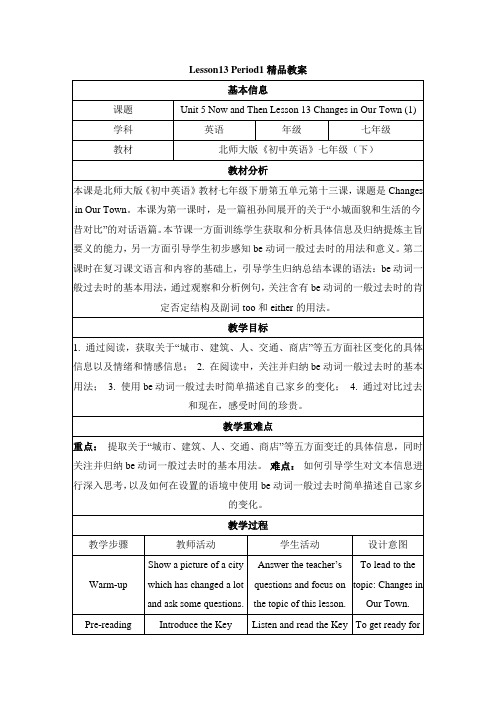
教学目标
1.通过阅读,获取关于“城市、建筑、人、交通、商店”等五方面社区变化的具体信息以及情绪和情感信息;2.在阅读中,关注并归纳be动词一般过去时的基本用法;3.使用be动词一般过去时简单描述自己家乡的变化;4.通过对比过去和现在,感受时间的珍贵。
教学重难点
重点:提取关于“城市、建筑、人、交通、商店”等五方面变迁的具体信息,同时关注并归纳be动词一般过去时的基本用法。难点:如何引导学生对文本信息进行深入思考,以及如何在设置的语境中使用be动词一般过去时简单描述自己家乡的变化。
教学过程教学步骤教师源自动学生活动设计意图
Warm-up
Show a picture of a city which has changed a lot and ask some questions.
Answer the teacher’s questions and focus on the topic of this lesson.
Post-reading
Play the recording of the dialogue and ask the students to read aloud with the speaker. Show the students the table and help them recall the changes in the town and ask them to work in pairs and talk about the changes in the town. Get the students to have a free talk about the changes in their hometown or Mentougou. Help the students look at the changes correctly. Show the students some pictures and some sayings about time to get them to learn to treasure time.
北师大版七年级英语下册Unit 5 Lesson 13课件(28张)
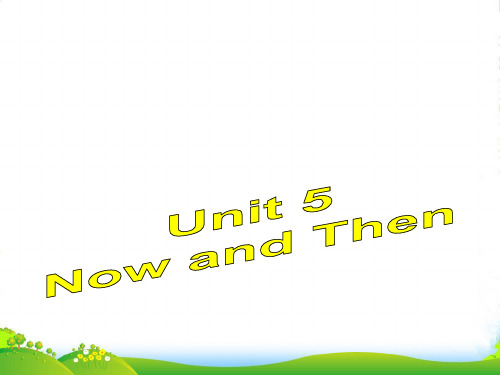
small
big cheap clean close dirty
expensive far
small
cheap clean close dirty expensive far
cheap clean close dirty expensive far
cheap expensive far
close
Read the dialogue again to complete the dialogue below.
a) They aren’t very expensive now. b) What was the traffic like before? c) Were they all your old neighbours? d) Was my mum always at the shopping centre?
Read the dialogue for the third time and answer: What changes are mentions in the dialogue?
the city
buildings
shops
Changes
people traffic
The town There weren’t Then was small. many tall
193
7
Lesson 13
Changes in Our Town
bad big cheap clean close dirty expensive far good short small tall
bad big cheap clean close dirty expensive far good short small tall
- 1、下载文档前请自行甄别文档内容的完整性,平台不提供额外的编辑、内容补充、找答案等附加服务。
- 2、"仅部分预览"的文档,不可在线预览部分如存在完整性等问题,可反馈申请退款(可完整预览的文档不适用该条件!)。
- 3、如文档侵犯您的权益,请联系客服反馈,我们会尽快为您处理(人工客服工作时间:9:00-18:30)。
Unit 5 Lesson 13 Changes in Our Town 2学习任务单
【学习目标】
1. 在语境中体会、发现和归纳一般过去时的意义,归纳、总结(出)be动词一般过去时的肯定句、否定句、一般疑问句和特殊疑问句的结构;
2.运用所学语法知识,在语境中正确使用was 和 were描述过去的状态;
3.正确读出双元音/iə/ 和/eə/,并归纳、总结出相应的字母组合。
【课前预习任务】
1.预习教材中第102页一般过去时be动词的语法部分。
2.收集一些自己小镇(城市)今昔变化的资料。
【课上学习任务】
Task 1:
1. Read after the recording to review the dialogue.
2. Answer the questions according the dialogue.
3. Collect the sentences and then make a summary about the past tense of be.
Task 2:
1.Find out the usage about the affirmative rules of “was, were”.
2.Find out the usage about the negative rules of “wasn’t, weren’t”.
3.Find out the differences between “too” and “either”.
4. Find out how to change affirmative sentences to general questions with “was, were” in them.
5.Find out how to change affirmative sentences to special questions with “was, were” in them.
6. Finish Activity 6,7,8,9 and 10.
Task3:
1. Listen to the recording and complete the words with ear, ere, air or are.
2. Summarize the combinations of letters which pronounce/iə/, /eə/ sound.
【课后作业】
1. Do Workbook Page 94, Exercise 1&
2.
2. Read with the recording about /iə/& /eə/ sound.
【课后作业参考答案】
Exercise 1
1. dirty;
2. short;
3. small;
4. cheap;
5. clean;
6. tall;
7. big;
8. expensive
Exercise 2
1. Were, were
2. Was, wasn’t, weren’t
3. was, was, is
4. either
5. too。
